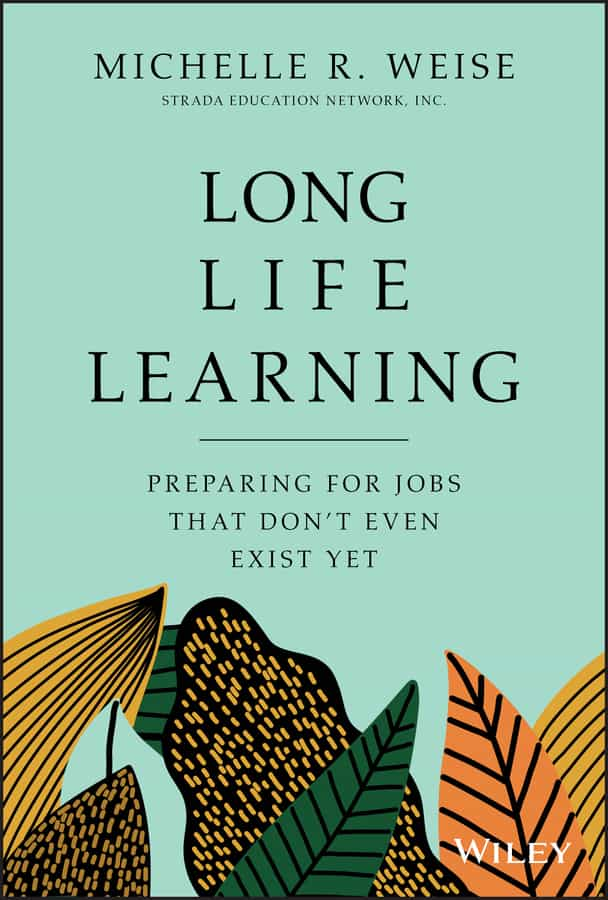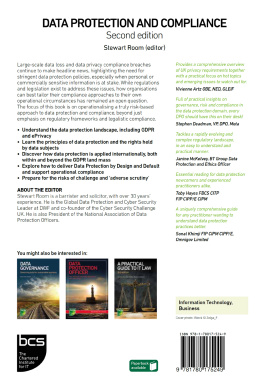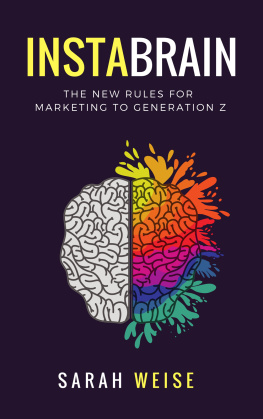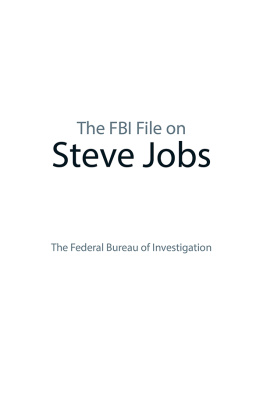Michelle R. Weise - Preparing for Jobs that Don’t Even Exist Yet
Here you can read online Michelle R. Weise - Preparing for Jobs that Don’t Even Exist Yet full text of the book (entire story) in english for free. Download pdf and epub, get meaning, cover and reviews about this ebook. year: 2020, publisher: Wiley, genre: Business. Description of the work, (preface) as well as reviews are available. Best literature library LitArk.com created for fans of good reading and offers a wide selection of genres:
Romance novel
Science fiction
Adventure
Detective
Science
History
Home and family
Prose
Art
Politics
Computer
Non-fiction
Religion
Business
Children
Humor
Choose a favorite category and find really read worthwhile books. Enjoy immersion in the world of imagination, feel the emotions of the characters or learn something new for yourself, make an fascinating discovery.

- Book:Preparing for Jobs that Don’t Even Exist Yet
- Author:
- Publisher:Wiley
- Genre:
- Year:2020
- Rating:4 / 5
- Favourites:Add to favourites
- Your mark:
- 80
- 1
- 2
- 3
- 4
- 5
Preparing for Jobs that Don’t Even Exist Yet: summary, description and annotation
We offer to read an annotation, description, summary or preface (depends on what the author of the book "Preparing for Jobs that Don’t Even Exist Yet" wrote himself). If you haven't found the necessary information about the book — write in the comments, we will try to find it.
Preparing for Jobs that Don’t Even Exist Yet — read online for free the complete book (whole text) full work
Below is the text of the book, divided by pages. System saving the place of the last page read, allows you to conveniently read the book "Preparing for Jobs that Don’t Even Exist Yet" online for free, without having to search again every time where you left off. Put a bookmark, and you can go to the page where you finished reading at any time.
Font size:
Interval:
Bookmark:

- Chapter 1
- Chapter 2
- Chapter 5
- Chapter 7
- Chapter 9
Long-Life Learning is a lifeboat for those of us swimming in the sea of confusingand often contradictingnarratives about the future of learning, working, and living. Throughout, Michelle brings thoughtful and diverse evidence to bear on a host of pressing challenges facing not just schools but all of society and offers a deeply integrative set of insights from her years as a student of disruptive innovation to chart a better way forwardrobots and all.
Brian Fleming, Vice President of Innovation and Strategy, Southern New Hampshire University
Without handwringing about the rise of automation, or finger-pointing at our current systems of education and employment, Long-Life Learning advances a vision of the future that puts the needs of workers at the center. Recasting us all as working learners, Michelle Weise illustrates not just the value of repeated returns to learning, but the critical importance of seamlessly interweaving education and work throughout our careers.
Van Ton-Quinlivan, CEO, Futuro Health
In Long-Life Learning, Michelle Weise articulates the critical need for adults to access an ever-evolving menu of learning and workforce skills development to remain relevant in the future economy and a 100-year work life.
Deborah Quazzo, Managing Partner, GSV Ventures
MICHELLE R. WEISE
STRADA EDUCATION NETWORK, INC.
Copyright 2021 Michelle R. Weise. All rights reserved.
Published by John Wiley & Sons, Inc., Hoboken, New Jersey.
Published simultaneously in Canada.
No part of this publication may be reproduced, stored in a retrieval system, or transmitted in any form or by any means, electronic, mechanical, photocopying, recording, scanning, or otherwise, except as permitted under Section 107 or 108 of the 1976 United States Copyright Act, without either the prior written permission of the Publisher, or authorization through payment of the appropriate per-copy fee to the Copyright Clearance Center, Inc., 222 Rosewood Drive, Danvers, MA 01923, (978) 750-8400, fax (978) 646-8600, or on the Web at www.copyright.com. Requests to the Publisher for permission should be addressed to the Permissions Department, John Wiley & Sons, Inc., 111 River Street, Hoboken, NJ 07030, (201) 748-6011, fax (201) 748-6008, or online at http://www.wiley.com/go/permissions.
Limit of Liability/Disclaimer of Warranty: While the publisher and author have used their best efforts in preparing this book, they make no representations or warranties with respect to the accuracy or completeness of the contents of this book and specifically disclaim any implied warranties of merchantability or fitness for a particular purpose. No warranty may be created or extended by sales representatives or written sales materials. The advice and strategies contained herein may not be suitable for your situation. You should consult with a professional where appropriate. Neither the publisher nor author shall be liable for any loss of profit or any other commercial damages, including but not limited to special, incidental, consequential, or other damages.
For general information on our other products and services or for technical support, please contact our Customer Care Department within the United States at (800) 762-2974, outside the United States at (317) 572-3993 or fax (317) 572-4002.
Wiley publishes in a variety of print and electronic formats and by print-on-demand. Some material included with standard print versions of this book may not be included in e-books or in print-on-demand. If this book refers to media such as a CD or DVD that is not included in the version you purchased, you may download this material at http://booksupport.wiley.com. For more information about Wiley products, visit www.wiley.com.
Library of Congress Cataloging-in-Publication Data:
Names: Weise, Michelle R., author.
Title: Long life learning : preparing for jobs that don't even exist yet / Michelle R. Weise.
Description: Hoboken, New Jersey : John Wiley & Sons, Inc., 2021. | Includes index.
Identifiers: LCCN 2020030474 (print) | LCCN 2020030475 (ebook) | ISBN 9781119597483 (cloth) | ISBN 9781119597513 (adobe pdf) | ISBN 9781119597520 (epub)
Subjects: LCSH: EmployeesTraining of. | Career education. | Occupational training. | Vocational education. | Manpower planning.
Classification: LCC HF5549.5.T7 W3879 2021 (print) | LCC HF5549.5.T7 (ebook) | DDC 650.1/3dc23
LC record available at https://lccn.loc.gov/2020030474
LC ebook record available at https://lccn.loc.gov/2020030475
Cover image: Maria_Galybina/Getty Images
Cover design: Wiley
For Mike, Noe, and Logan, the loves of my life,
and for the risk takers, innovators, and coalition builders,
this book is for you.
One of the great privileges of my life was working with Clayton Christensen, the godfather of the theories of disruptive innovation. I coauthored a few pieces with him, including a short book on disruption in postsecondary education.
After his much-too-early death in January 2020, I've reflected a great deal on how his theories have given me the foundation for a more hopeful stance toward the future. This, to me, is the most profound takeaway of disruption. It is not, as so many assume, the key to doomsday predictions about an industry. Instead, the theories of disruption are powerful because they provide a constructive and positive lens through which to analyze the unknown and the nascent.
Clay's theories give us pause as soon as we start to dismiss something that smacks of low quality, because it is precisely at that moment that we should wonder if there's something we should be paying attention tosomething that might be just good enough (his words) to gain traction with people whose alternative is nothing at all. He called this population nonconsumers.
Prior to the pandemic, my team of education and workforce researchers at Strada Education Network's Institute for the Future of Work was focused on these nonconsumers, the people being left behind by the great deficiencies of our American education and workforce infrastructure. Over the course of more than 100 hour-long interviews, we listened to working-age adults displaced by the 2008 financial crisis who were unable to recover while the top 1 percent of the American labor market captured 85 percent of the income growth in the years following the recession. Throughout this book, you will hear from many of these displaced workers.
They include a high school graduate who was promised opportunities for growth at her local pharmacy but never saw those promotions come to pass due to the constant churn in staff and managers. They are also the people whose caregiving responsibilitiesfor young children, aging parents, or family members with disabilitiesmake it impossible to fit into the one-size-fits-all structure of many educational institutions.
Their personal experiences reveal how ill-suited our current postsecondary education and workforce systems are at facilitating seamless, flexible, and cost-effective learning pathways for people to keep up with the emerging demands of the economy. If students don't follow the typical two- or four-year college experience, our systems do not make it easy for them to return and retrain in the future. Learners are left to force-fit nonlinear realities into a rigidly linear system.
Next pageFont size:
Interval:
Bookmark:
Similar books «Preparing for Jobs that Don’t Even Exist Yet»
Look at similar books to Preparing for Jobs that Don’t Even Exist Yet. We have selected literature similar in name and meaning in the hope of providing readers with more options to find new, interesting, not yet read works.
Discussion, reviews of the book Preparing for Jobs that Don’t Even Exist Yet and just readers' own opinions. Leave your comments, write what you think about the work, its meaning or the main characters. Specify what exactly you liked and what you didn't like, and why you think so.









